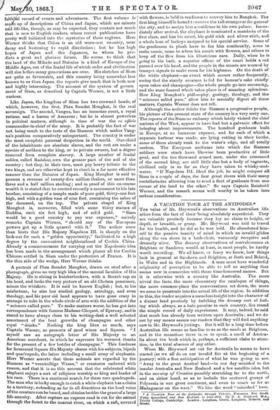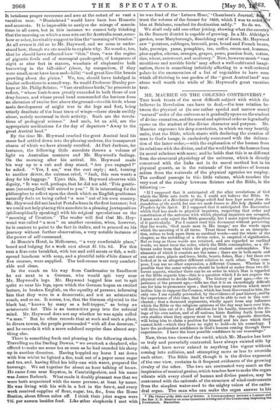A VACATION TOUR AT THE ANTIPODES.* TRH value of Mr.
Heywood's observations on Australian life arises from the fact of their 'being absolutely superficial. They are valuable precisely because they lay no claim to height, or depth, or breadth, or grasp. Mr. Heywood was told to travel for his health, and he did as he was told. He abandoned him- self to the passive inanity of mind in which an invalid glides along the sea shore in a bath-chair, vacuously receptive and dreamily alive. The dreamy observations of convalescence at Brighton or Sandown would, at least, in most people, be hardly worth recording. We all know, or fancy we know, how things look in general at Sundown and Brighton, at Bath and Bristol, in Wales and in the Highlands. A man must have wonderful originality of perception to be able to tell us anything that seems new in connection with those time-honoured names. But it is otherwise with a country like Australia. The more trivial the facts, the more elementary the catalogue of things, the more common-place the conversations set down, the more we seem to penetrate into the actual life of the region. In addition to this, the reader acquires a nameless insight into the character of a distant land precisely by imbibing the dreamy sort of feel- ing which always, as a halo peculiar to each country, lies round the simple record of daily experiences. It may, indeed, be said that much has already been written upon Australia ; and we do not by any means assure our readers that they will find anything new in Mr. Heywood's jottings. But it will be a long time before Australian life seems as familiar to us as the sands at Brighton, and in the meantime there is, so to speak, a smell of Austra- lia about the book which is, perhaps, a sufficient claim to atten- tion, in the total absence of any other.
When Mr. Heywood set out for Australia he seems to have started (as we all do on our invalid fits at the beginning of a journey) with a fine anticipation of what he was going to see. "Away to the great Austral land—in our day vanished to the insular Australia and New Zealand and a few satellite isles, but in the morning of Creation possibly stretching far to the north, and on either hand, so as to include the scattered groups of Polynesia in one great continent, and even to reach so far as Madagascar on the west." We like the word " minished " here.
* A Vacation Tour at the Antipodes, through Victoria, Tasmania, New &We Wales, Queensland, and New Zealand, in 1801-1862. By B. A. Heywood, ALA., Trinity College, Cambridge. London . Longman, Green, Longman, Roberta, sail Green. It betokens proper reverence and awe at the outset of so vast a vacation tour. "Diminished" would have been less Homeric and accurate. It is impossible to analyze the mirage of associa- tions in all cases, but in this instance we cannot help thinking that the morning on which a man sets out for Australia must, some- how or other, inevitably suggest to him the" morning of Creation." At all events it did so to Mr. Heywood, and we seem to under- stand how, though we are unable to explain why. No wonder, too, that be should have reflected how "this," then, "was the region of gigantic fowls and of marsupial quadrupeds, of kangaroos of eight or nine feet in stature, wombats of elephantive bulk burrowing in the hill-sides" (these, by comparison, if they were small, must have been mole-hills) "and great lion-like beasts prowling about the plains." We, too, should have indulged in similar reflections in a small way. So would Professor'lluxley per- haps or Mr. Philip Sclater. "Vast struthious birds,"he proceeds to reflect, "whose limb-bones greatly exceeded in bulk those of our dray-horses, and whose proud head commanded the horizon from an elevation of twelve feet above the ground—terrible birds, whose main development of might was in the legs and feet, being utterly destitute of the least trace of wings—these strode swiftly about, mainly nocturnal in their activity. Such are the revela- tions of geological science." And such, let us add, are the appropriate meditations for the day of departure "Away to the great Austral land."
By the time Mr. Heywood reached the great Austral land his muse had settled down into the pleasing undress, the transparent charm of which we have already extolled. At Port Jackson, for instance, the following little anecdote throws a volume of light on Australian manners and Mr. Heywood's feelings. On the morning after his arrival, Mr. Heywood made his way up to a cab and dray stand, "Are you engaged ?" he asked. "Yes, I am," was the curt reply ; and, turning to another driver, the cabman cried, "Jack, this man wants a dray for his luggage." Upon this, Mr. Heywood observes with dignity, "It was well, perhaps, that he did not add, 'This gentle- man (meaning Jack) will attend to you.'" It is interesting for the philosopher to reflect upon the shock which an English gentleman naturally feels on being called "a man" out of his own country. Mr. Heywood did not land at PortJackson in the first instance; but we could not help placing this anecdote in a pleasing juxtaposition (philosophically speaking) with his original speculations on the "morning of Creation." The reader will find that Mr. Hey- wood was called "a man" on another occasion, when, however, he is content to point to the fact in italics, and to proceed on his journey without further observation, a very notable instance of the power of self-command.
At Menzie's Hotel, in Melbourne, "a very comfortable place," board and lodging for a week cost about 31. 128. 6d. For this sum a first-rate breakfast, with hot and cold meats or fish, a well- spread luncheon with soup, and a plentiful table d'hôte dinner of five courses, were supplied. The bed-rooms were very comfort- able and clean.
In the coach on his way from Castlemaine to Sandhurst he sat next to a German, who would spit very near Mr. Heywood's legs. Mr. Heywood begged him not to spit quite so near his legs, upon which the German began an excited lecture, in broken English, on the equality of persons, informing him that they were in a democratic, and not an aristocratic coach, and so on. It seems, too, that the German objected to the black hat, "known by many as a bell-topper," as being an aristocratic hat. This is an instructive peep into the colonial mind. Mr. Heywood does not say whether he was again called "a man." But he often records that at such and such a place, in divers towns, the people promenaded" with all due decorum," and he records it with a more subdued surprise than almost any- thing else.
There is something fresh and pleasing in the following sketch. Travelling on the Darling Downs, "we overtook a shepherd, who offered to make me some tea as soon as he had rounded his sheep up in another direction. Having hoppled my horse I sat down with him whilst he lighted a fire, took out of a paper some sugar and tea, and, having filled his billy-can with water, prepared the beverage. We sat together for about an hour talking of home. He came from near Royston, in Cambridgeshire, and his name was James Badcock. What made it doubly pleasant was that we were both acquainted with the same persons, at least by name. He was living with his wife in a hut in the forest, and every week received supplies of flour, sugar, tea, &c., from the Home Station, about fifteen miles off. I think their joint wages were 75/. per annum besides food. Like other shepherds I met with he was fond of the Leisure Hour,' Chambers's Journal,' & trust the volume of the former for 1860, which I was to order him at Brisbane, reached its destination safely." So do we.
We shall only add one other jotting, showing what the country in the Burnett district is capable of growing. In a Mr. Aldridge's garden, near Maryborough, flourishing out of doors, Mr. Heywood saw "potatoes, cabbages, broccoli, peas, broad and French beans, kale, parsnips, yams, pumpkins, tea, coffee, cocoa-nut, bananas, pine-apples, citrons, oranges, grapes, pears, passion fruit, cotton, rice, wheat, arrowroot, and mulberry." Now, however much "vast struthious and terrible birds" may affect a well-cultivated imagi- nation, there is something infinitely affecting to a well-ordered palate in the enumeration of a list of vegetables to have seen which all thriving in one garden of the "great Austral land" was alone well worth the while of Mr. Heywood's great vacation tour. or































 Previous page
Previous page